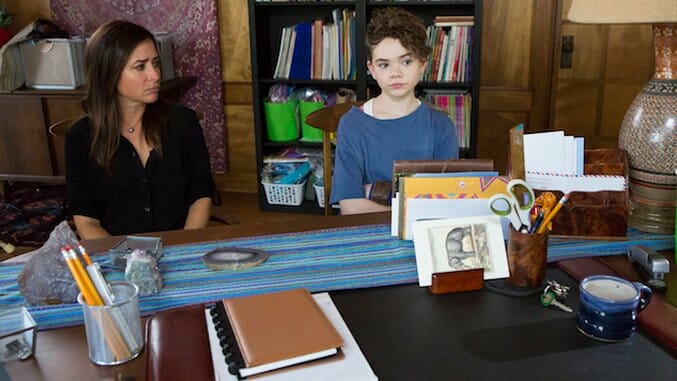Why the Season Finale of Better Things Is One of the Year’s Best TV Episodes
Jessica Brooks/FX
In the season finale of Better Things, Laurie Anderson’s “O Superman” signals the change of key. With her youngest daughter, Duke (Olivia Edward), feigning a sore throat, and her mother, Phyllis (Celia Imrie), still smarting from the cancellation of their planned jaunt to Santa Barbara, Sam Fox (Pamela Adlon) swings into action with the song’s first fretful chords, as if swept up in the morning’s current.
For nearly six minutes, so is the camera, twirling and spinning with her routine’s rush: To face Frankie (Hannah Alligood), Sam’s middle child, from across the upstairs landing, exasperatedly demanding a vintage dress to wear to school; to broker a peace with Sam’s eldest, Max (Mikey Madison), so quick with her lacerating criticism; to greet the housekeeper, Esperanza (Lidia Porto), suffering through the after-effects of food poisoning, and the accountant, Rey (Cuete Yeska), bearing checks for Sam to sign. It’s not for the feat itself that we follow her—the sequence contains a handful of cuts, as Sam tries, for instance, to sext a suitor—but to suggest her day’s heedless rhythms, a pileup of minor crises that seems never to subside. With homemade lunches and cereal cups, lost jeans and “mishegoss,” “Only Women Bleed” rides the momentum of domestic details until Sam closes the door after her children’s departure, exhausted before she’s begun. ”’Cause when love is gone, there’s always justice,” “O Superman” promises. “And when justice is gone, there’s always force. And when force is gone, there’s always Mom. Hi Mom!”
It’s rare, even in an era of serious comedies, for the erstwhile “sitcom” to narrate its stories in the language of film form: There’s Atlanta’s undercurrent of surrealism and You’re the Worst’s understanding of psychic distress; Richard Shepard’s dreamlike episodes of Girls and Andrew Haigh’s careful, affectionate naturalism on Looking. Rarer still is the series that condenses its foremost merits into a gorgeous half hour, or for that matter a single, breathless sequence: Frank, artful, and effortlessly funny, “Only Women Bleed” is Better Things in microcosm, a moving tribute to the essential, everyday work of women that counts among the finest TV episodes of the year.
Co-created by Adlon and Louis C.K., Better Things hasn’t generated the excitement of its FX counterpart, Atlanta, but it’s no less novel for elaborating a multigenerational portrait of women in which sex and romance are not the determining factor in life’s equation. When Sam glances at her phone again after the clamor quiets, it’s as another distraction to be dealt with, no longer run through with erotic charm, and she sets the man’s request aside unanswered; later, in the car, she half-heartedly participates in phone sex, coaxing him to finish so she can get on with her errands. The series’ debut season, in which men largely remain on the margins, is far more interested in the testy, soused relationship she maintains with her mother, with the wan roles she’s offered as a moderately successful middle-aged actress, with the ceaseless chaos of single motherhood.